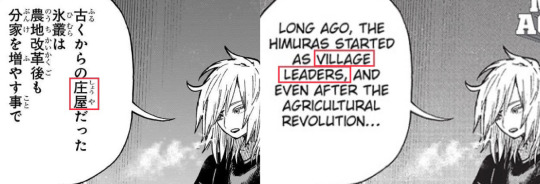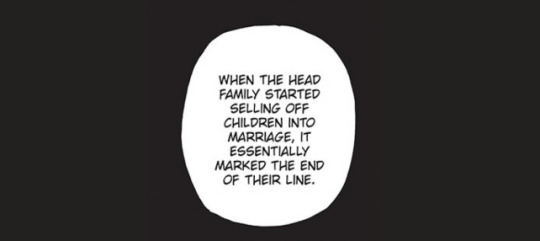#I did allllll this research and wrote allllllll this solely because of my love for Geten
Text
The Himura clan
did some research! lots of research, actually, all about what being 'village headmen' entailed, what it meant to be wealthy post-land reforms, and I've even come up with a theory/explanation about why they had numerous branch families. let me share what I've found:
(but first, please go read @stillness-in-green’s wonderful review of chapter 387 that contains a great explanation on clan intermarriage and how the situation at the Himura’s must have looked!
The 庄屋 - Shouya - "Village Leaders"

Shouya translates to village headmen, village leader - which is correct, but I don’t think that tells the whole story. So I’ll tell it to everyone:
The 'village headman' (and his lineage) was part of a specific, special rank of 'titled' peasants during the Tokugawa period (1603 - 1867). Basically, they were the elite of the peasant elites. When the shogunate came into power, it created a new system of village offices of headman and council to better collect taxes - and this new status granted prestige and the power to collect and deliver tribute, keep records and maintain the population register, and generally presiding over all public affairs. Headmen were still peasants, but they would be allowed things that would normally be only entitled to the warrior/samurai class, like the usage of surnames, the wearing of silk, and even carrying one (1) small sword.
(Source: Tokugawa Village Practice, by Herman Ooms)
With these culminated privileges and means, then, it was easy for village headmen to get cultivate lots of land, get rich, establish lineages and cadet branches, cultivate more land, get richer, etc. This being feudalism, all land belonged to the central state, so they weren't exactly landowners, but they essentially functioned as wealthy landlords (and became exactly that when the Meiji era (1868 - 1912) established the right to private land ownership.)

This is what the Himura(?) marriage broker meant when they talked about how the family was once "considered prestigious, with a long and storied history", and when Geten spoke of the Himura having wealth and pride. This is a family who could trace their history and genealogy back to samurai times, a lineage with inherited land and fortune that has been continuous for over 500 years by the time the story in HeroAca takes place.
The 農地改革 - Nouchikaikaku - Land Reforms

idk what exactly Official Viz Translator Caleb Cook was thinking when he decides to translate nouchikaikaku - agrarian reforms - as ‘agricultural revolution’ which (to me) brings to mind ‘the era when cavemen starts farming’. It’s not incorrect, exactly, but there are much better options that have more accurate connotations. Nouchikaikaku can be referring to land reforms in general, but here, it is almost certainly talking about the post-WWII land reforms of 1947.
Some background: When poor farmers fall into debt - due to crop failures, due to the chaotic economic times, due to random things like "a fall in the price of rice coinciding with the expense of a wedding or funeral where social custom would permit of no stinting", just having one bad day, etc. - they usually were forced to sell their land... then stay and become tenant farmers on that same land, except now they were paying rent that could be as high as half their income. Thus a system of landlords and tenants came to be, and the gap between their economic statuses would widen.
By 1941, 46% of cultivated land in Japan were tenanted; and only 30% of peasants owned all the land they tilled. (In other words, landlords owned nearly half of all farmland, and 70% of farming households were tenants of some kind.)
(Source: Land Reform in Japan, by Ronald Dore)
This is where land reforms come in, in order to correct this inequality.
After the war, all absentee landowners and landlords who own too many acres were required to sell their land to the government, who then sold it to the people who actually worked the land. In this way, large landlords was practically eliminated, tenant farming was no more, and every farming family became proper small property owners, and Japan's land reform is considered today to be one of the most successful in history.
The whole purpose of the land reforms was to reduce the wealth and power of rich landlords... So how is it that the Himura clan somehow found a way to keep all that?
This is, I think, where the key words of "by creating branch families" come into play.
Quick jump back to the agrarian reforms: Under the land reform laws, owning and selling land became a very regulated affair - Corporations and non-farmers cannot own farmland; there was a maximum limit to how much land a person/family could have; only limited local landlording was allowed, and even then, tenants rights were favored.
Essentially, the “only way an individual could acquire farmland was by joining a farm family through birth, adoption, or marriage, then co-residing with the preceding generation until inheriting the parents' land, and eventually passing the same land to a household heir to repeat the cycle.”
So, my theory:
The Himura, as wealthy ancestral landlords, were bound to lose land (and their fortune) when the land reforms came. To avoid doing so - or, rather, to gain back land they had to sell - they could've started marrying local neighboring families, bringing them into the Himura clan. Each non-eldest, non-inheriting son who married out would already be creating a branch, and have access to his wife's family's land; with the Himura's influence and status, it wouldn't be strange if their daughters' husbands take the Himura name instead of the other way around.
Heck, they also could've just adopted people - one traditional method was indeed this: "families often adopted as “branch families” people who were not related by blood. This kind of branch family was often in an economically subordinate position: perhaps a family of farm workers who depended on the stem “family” for land and tools. The fictive familiar relationship added extra depth and strength to the economic relationship."
Thus, on paper, a tract of land is owned by a individual couple or family... but that couple or family is now Himura, and therefore the Himura clan have increased in branch families, and maintained/maybe even increased their wealth (land), exactly as Geten says.
Which is why when the Advent came, "Heteromorph blood" became so abhorrent?
To be sure, they were likely just bigots who discriminated against Heteromorphs for being different.
However, if their whole operation had been to bring people into the clan, this hatred would mean a loss of marriage and adoption candidates. Anyone who had heteromorphic quirks were out; anyone who came from a family that had even one (1) individual with a heteromorphic quirk was out, since that trait could be inherited. As @stillness-in-green points out in her post, "Given that the characters in-universe still don’t know the origin of quirks, there’s no way to completely guarantee desirable quirks, or even to perfectly guard against the dreaded heteromorphic quirks," outsiders had the potential to bring surprise heteromorph blood, which would've been horrifying for them.
Official Viz Translator Caleb Cook translated this part as 'They [the Himura] didn't want to dilute their blood', but the more accurate translation, I feel, would be 'they hated the mixing of blood'.

'Dilute' gives off the sense that they wanted to keep their 'Himura essence' or whatever pure, which is true to a point; but in the context that Mr. Compress gives us - heteromorph discrimination - and how it's only after the Advent that the result of clan endogamy came to be, I think it's more accurate to say that, yeah, the Himura specifically did not want to associate or mingle with 'unknown qualities', so to speak. They hated the idea of that ‘mixing'; so the Himura had to turn inwards to be certain that no heteromorph lineage could be mixed into the clan.
In doing so, the Himura would've lost their traditional method of growth. No more increasing branch families; instead, the branches would combine and decrease. No more obtaining, inheriting, and accumulation of land to the Himura name. The family shrink and wane, and eventually lost everything altogether.
(and the final delicious irony of all this is that their last ditch effort to marry off Rei would be consistent with their earlier methods, trying to save themselves and obtain wealth...

except this time it would be too little, too late.)
*
Thanks for reading!
#Himura Family#Himura Clan#Geten#Todoroki Rei#Heteromorph Discrimination#Chapter 387#Chapter 301#HeroAca#bnha#mha#worldbuilding#actually it would be more#history#?#I did allllll this research and wrote allllllll this solely because of my love for Geten#tu superbus Himura nube#Himura#nalslastworkingbraincell
119 notes
·
View notes